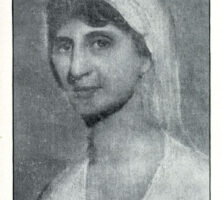Elizabeth Lichtenstein (or Lightenstone) Johnston was a fervent Loyalist who lived through the upheaval of the American Revolution (1775-83) in Georgia. At the age of seventy-two, she wrote graphic recollections of her experiences, providing the most detailed firsthand account of the ways in which the Revolution affected women in colonial Georgia.
Johnston, an only child, was born on a small farm beside the Little Ogeechee River on May 28, 1764, to parents who reflected the diverse roots of Georgia’s earliest immigrants. Her father, Johann Lichtenstein, had emigrated from St. Petersburg, Russia, and was employed as a scout-boat pilot by the royal government. Her mother, Catherine Delegal, whose father, Philip Delegal, had commanded a company under James Oglethorpe, was of French Huguenot stock. Johnston remembered her childhood days fondly, especially those after her father had purchased a plantation on Skidaway Island, where she enjoyed figs, peaches, pomegranates, and plums, as well as fine fish, oysters, crabs, and shrimp. Her tranquil country life was brought to an abrupt halt by the death of her mother in 1774, and she was sent, reluctantly, to be schooled in embroidery by an elderly aunt in Savannah.

Johnston held bitter memories of the oncoming Revolution, describing how the rebels (including some of her teachers) were a “ragged corps” and how “everywhere the scum rose to the top.” At the age of twelve she was violently separated from her father, who, with the assistance of his enslaved workers, fled to the safety of a British warship, the HMS Scarborough. Johnston was indignant at the treatment of Loyalist women and children, some of whose lands were confiscated, and she was terrified during the Siege of Savannah in October 1779, when Continental Army forces under General Lachlan McIntosh and their French allies shelled the town for several days.
With the exception of this failed allied counterassault, British occupation of the Lowcountry between December 1778 and July 1782 brought some limited respite for Johnston and her fellow Loyalists, while Patriots, in turn, suffered confiscations and depredations. At the tender age of fifteen, she was courted by officers in the Tory militia and married twenty-five-year-old William Martin Johnston (a captain in the New York Volunteers) on November 21, 1779. The Johnstons, like thousands of other Georgia Loyalists, were forced to evacuate Savannah and begin the search for a new home upon Britain’s defeat. Elizabeth would bear ten children, seven of whom survived beyond infancy, and their places of birth pay testament to her repeated upheavals: Savannah; Charleston, South Carolina; St. Augustine, Florida; Edinburgh, Scotland; Jamaica; and finally Nova Scotia. Little wonder that she signed her letters to her husband as “your once truly happy, tho’ now afflicted wife.”

While her Recollections are unique in the historical record, there were many women of strong character, clear intellect, and deep religious and political convictions on both sides of the conflict. They profoundly influenced the course of the Revolution in Georgia and how that war would be remembered by subsequent generations.








